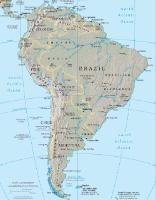LIMA, Peru -- Earlier this month, lawmakers in the United States passed a bill that would renew trade preferences to four countries in South America. The Andean Trade Preferences Act was signed in 1991 and eliminated tariffs on a host of exports from Colombia, Bolivia, Ecuador, and Peru in an effort to bolster economic development in the region and offer alternatives to drug trafficking. The latest renewal was set to expire at the end of this year. U.S. President George W. Bush is expected to sign the bill, despite having requested last month that Bolivia's beneficiary status be suspended, citing lack of cooperation from President Evo Morales on drug eradication efforts. If signed, the bill would extend trade preferences for Colombia and Peru until the end of 2009. Bolivia and Ecuador would see only six-month extensions. The renewal comes amid a heated debate in the United States over free trade agreements (FTAs). Late last year, both Houses of the U.S. Congress approved the U.S.-Peru Trade Promotion Agreement, with supporters of the FTAs arguing that they grant the U.S. the same duty-free access to the Andean countries as they currently receive to the U.S. economy.
Bilateral Free Trade Agreements Face Challenges in South America

